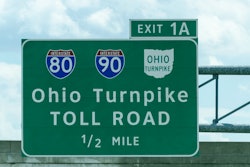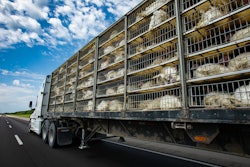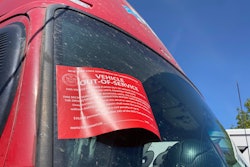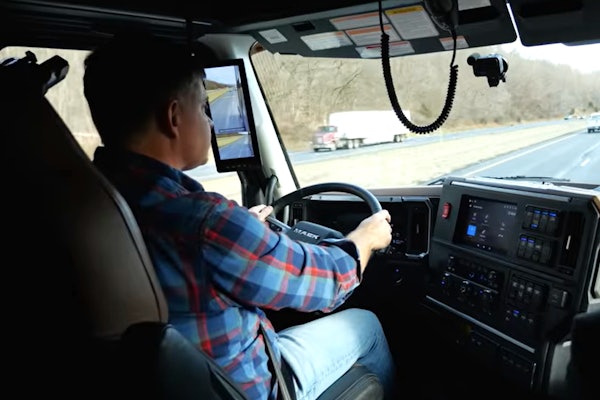Trucking news and briefs for Thursday, Feb. 13, 2025:
Legislation would ensure electric cars pay for road wear and tear
A bill introduced in Congress Wednesday, Feb. 12, would ensure that electric vehicles (EVs) pay into the Highway Trust Fund (HTF) to support the construction and maintenance of U.S. roads and bridges.
The bill -- dubbed the Fair Sharing of Highways and Roads for Electric Vehicles (Fair SHARE) Act -- was introduced in the Senate by Sen. Deb Fisher (R-Nebraska) and cosponsored by Sens. Cynthia Lummis (R-Wyoming) and Pete Ricketts (R-Nebraska). Identical companion legislation was introduced in the House by Rep. Dusty Johnson (R-South Dakota).
Fischer noted that gasoline-powered cars pay into the HTF through the gas tax, but currently, EVs do not contribute to the HTF at all, despite weighing considerably more due to the weight of large EV batteries.
The bill would require light-duty EVs (those with a gross vehicle weight rating less than 8,500 pounds) to contribute to the HTF through a two-tier fee structure similar to and modeled after the current federal gas tax and the heavy vehicle use tax. Heavy-duty electric trucks already contribute to the HTF through the Heavy Vehicle Use Tax, the tire tax, and the federal excise tax, the American Trucking Associations noted.

[Related: Trump II and the outlook for speed limiters, broker transparency, parking push]
The first tier of the fee structure would impose a one-time fee of $1,000 on EVs at the manufacturer level, at the point of sale. This fee would be appropriated to the HTF. The $1,000 fee equals the average amount consumers currently contribute to the HTF from gas taxes calculated over a span of 10 years, Fischer noted. Light-duty vehicles with internal combustion engines have an average lifespan of 100,000 miles, which equates to approximately 10 years.
The second tier of the fee structure would impose a one-time fee of $550 on each battery module with a weight greater than 1,000 pounds to be imposed at the manufacturer level and would be appropriated to the HTF. Fischer explained the reasoning for this fee is that under the current structure, heavy trucks account for the additional costs they impose through the Heavy Vehicle Use Tax. Trucks with a gross weight of 55,000 pounds pay $100 plus $22 per 1,000 pounds over 55,000 pounds. At 75,000 pounds, the tax is capped at $550.
Trucking associations voiced support for the bill, noting light-duty EVs should have to pay their fair share.
Owner-Operator Independent Drivers Association President Todd Spencer said truck drivers “make significant contributions to maintaining our roads and bridges by paying several taxes that support the Highway Trust Fund,” adding that they “are understandably frustrated that EVs currently pay nothing to the HTF despite having equal access to the roads and highways maintained by taxpayers.”
Likewise, ATA applauded the legislation, noting that “no one should get a free ride” for highway funding, said ATA Senior Vice President of Legislative Affairs Henry Hanscom. “The trucking industry makes up just 4% of the vehicles on our nation’s highways, yet we pay nearly half the tab into the federal Highway Trust Fund -- all while moving over 70% of the domestic freight tonnage. Clearly trucks are doing their part to invest in the nation’s infrastructure, and it is reasonable to expect electric vehicles to do the same.”
[Related: ATRI report cautions VMT costs could outweigh benefits]
Trucking company owner, others charged in bribery scheme
The United States Attorney’s Office for the District of Colorado charged a trucking company owner and two others with conspiracy to commit money laundering arising out of a scheme to submit fraudulent invoices to a contractor providing services for a Colorado electrical utility.
Charged in the case were Edward Joseph Chmiel, 49, and Sabino Loera, 51, who worked for a company providing electrical contracting services to a utility company in Colorado; and Henry Lozano, 43, who owned a company providing trucking and hauling services.
In August 2018, the three allegedly agreed that Lozano’s company would provide those services in exchange for kickback payments to Chmiel and Loera. To generate the money that would pay the kickbacks, the three schemed to submit false invoices from Lozano’s company to Chmiel and Loera’s company.
Once Lozano was paid for those invoices, Loera would direct Lozano to issue checks to a network of 15 other people. Those people cashed the checks and then gave the cash to Chmiel and Loera.
Between August 2018 and June 2020, the false invoices generated approximately $1,495,781.51 in kickback proceeds.
Border officers bust cocaine-hauling tanker
U.S. Customs and Border Protection Office of Field Operations officers at the Eagle Pass Port of Entry in Texas seized more than $1.4 million in cocaine from a truck pulling a tanker on Feb. 6.
The seizure occurred at the Camino Real International Bridge when a CBP officer referred a 2013 Freightliner tractor hauling a fuel tanker for secondary inspection. CBP officers conducted a secondary examination that included utilization of CBP canines and a non-intrusive inspection system.
Upon further physical examination, CBP officers discovered 42 packages containing a total of 108.29 pounds of alleged cocaine hidden within the tractor. The narcotics had an estimated street value of $1,445,896.
CBP seized the narcotics, tractor and tanker. Homeland Security Investigations (HSI) special agents initiated a criminal investigation into the seizure.








